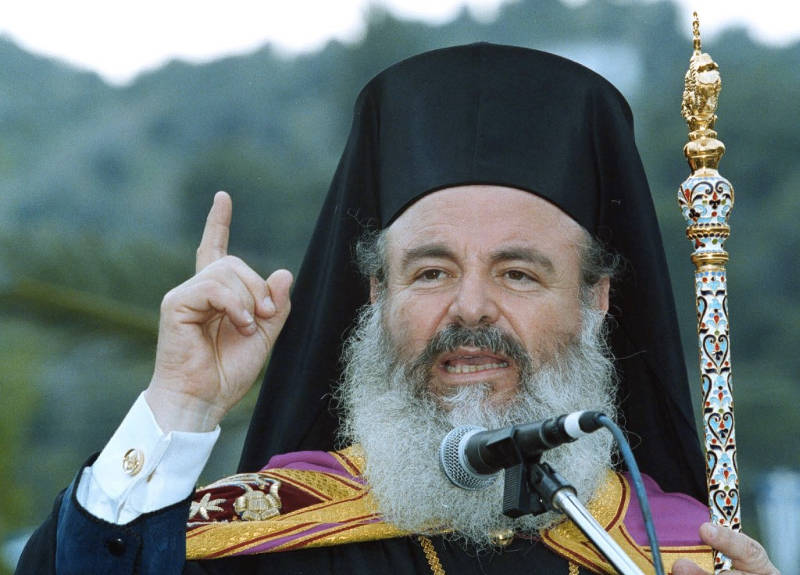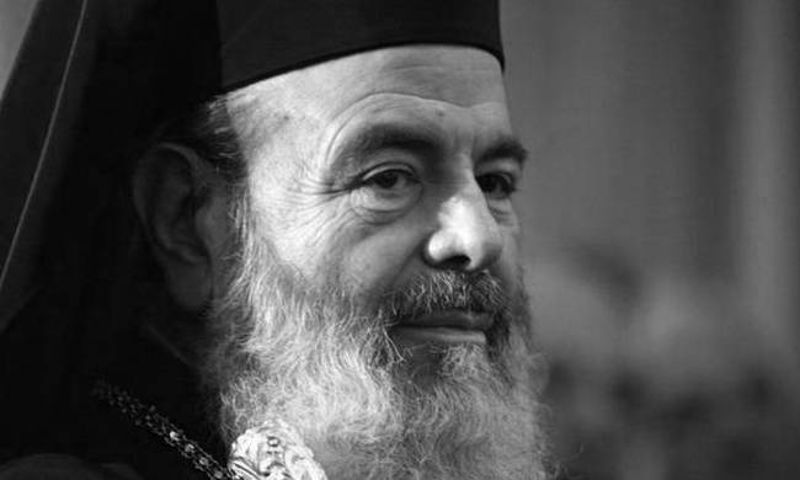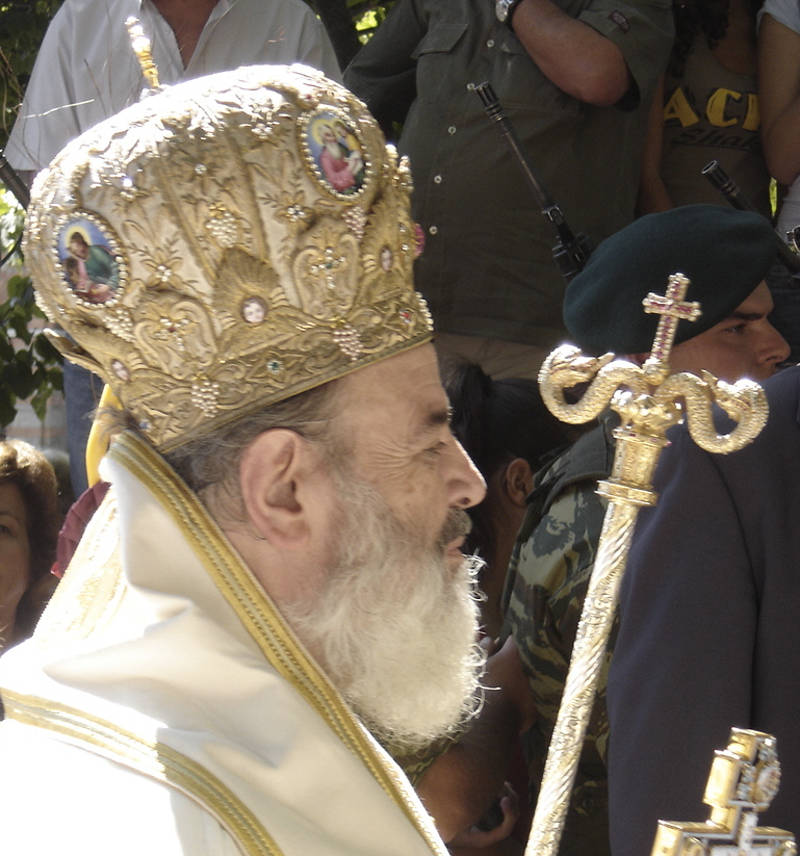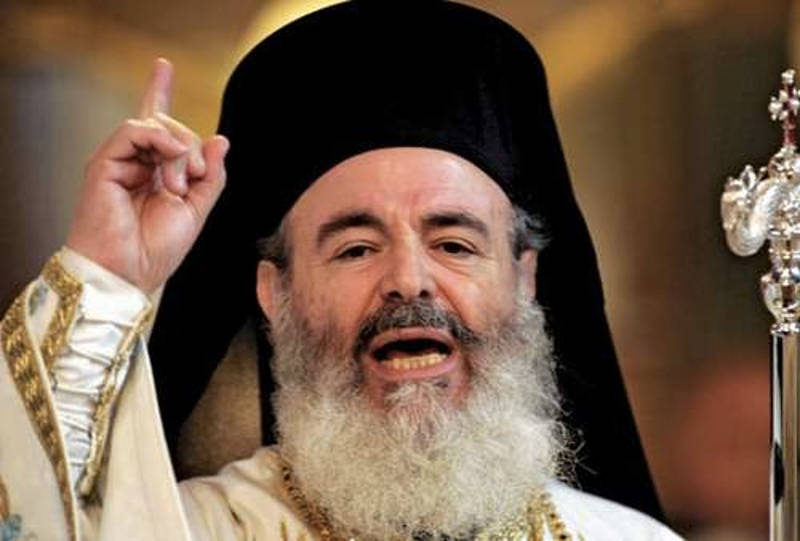Manos Loizos : the artist of revolution friendship and solidarity
The Life, Encounters, and Achievements of The Famous Greek Musician and Composer

He was the youngest hierarch of the Orthodox Church — and the one who dared to take it in his hands and break taboos. He called upon young people to come back to church — in whatever way they felt comfortable.
“We like you, Christodoulos!” they used to cheer. And he would smile and reply, “I like you too…”
A true leader. A representative of Christianity and Orthodoxy. Perhaps even a controversial figure.
He walked a fine line — showing both his authority and his sensitivity. He spoke about things most priests avoided: loneliness, drugs, unemployment, even politics. And he did it not with fear, but with honesty — addressing the souls of Greek people in a language they could understand. Direct. Warm. Unapologetic.
I had the chance to meet him just before he began his personal Golgotha — during one of my trips to Greece. I was asked to be best man at a wedding — for a couple I had met only the day before. They approached me because they wanted their marriage to be blessed by Archbishop Christodoulos himself. They had already reached out to his office, but the answer they received was clear: that would only happen if a well-known public figure served as their best man.
And so, when they met me — they asked.
Along with a well-known reporter, they hoped my name would help open the door. At first, I was hesitant. I had never been what you'd call “close” to the Church. I was never devout. I’ve always believed that God is love — and so I worship love more than doctrine. I never saw God as a punisher. Whatever name mortals give Him, to me He is one and eternal — and always ready to forgive. I had no connection to the ceremonial, institutional side of religion. For me, faith and prayer were always something deeply personal. That’s why I had real reservations about participating in a sacrament. But I couldn’t ignore the honor this moment represented for them — the chance to be blessed by the Archbishop of Greece himself.
I must remind you: my public image was what granted them “access” to the Archbishopric. That’s what allowed Archbishop Christodoulos to attend — and to make their dream come true. The wedding was set to take place at the Church of Saint Constantine in Glyfada. When I arrived, I was stunned by the scene. A kind of sacred chaos. The entire area was overflowing with people. Cameras, reporters, locals. Red carpets, chandeliers, flowers everywhere. The energy felt like an old-Hollywood, high-society version of the Oscars — only this time, the spotlight was cast on a wedding. And behind it all, the reason they had come: the presence of the Archbishop.

The chancel was filled with dozens of priests and bishops, all dressed in surplices woven with gold and silver. Six stood on each side as they began the sacrament.
Two full choirs were chanting, and every corner of the church was packed with people — standing, sitting, leaning wherever space allowed. But Archbishop Christodoulos had not arrived. As I sat near the couple, I overheard someone whisper with a smile,...“Feels like we’re waiting for Marinella…”
(Note from the author: Marinella is one of Greece’s most legendary singers and cultural icons.)
The ceremony was nearing its end, and yet the “famous guest” had still not appeared. I began to wonder — was he really going to show up? And then… The star arrived. Just after a long, rising phrase from the choir, Archbishop Christodoulos appeared — stepping slowly into the chancel, surrounded by his retinue. Three attendants held the edges of his heavy, embroidered vestments so he could walk without stumbling. Greatness, it turns out, doesn’t shout. It enters. In an instant, everything changed.The atmosphere in the church shifted. The space felt brighter — not from the chandeliers or the candles, but from him. There was a charisma radiating from that man that I had never experienced before. I looked at him, almost frozen. “This is unbelievable,” I thought. “He’s… a star.” When the wedding was over, the couple left the church, accompanied by the waves of people who had come to witness it. And then — just as I was preparing to leave — the Archbishop’s secretary approached me quietly.
“His Eminence would like to meet you,” he said.
In truth, it was a gesture. A polite, symbolic greeting. But I understood what it meant. The Archbishop wanted to acknowledge the “famous” best man.

I moved toward the back of the church where he was waiting for me, and I felt a strange nervousness rising. I looked at his face — that same glow was still there, almost unsettling in its calm intensity. His secretary introduced us, and we began speaking, just standing there. After all, it was supposed to be a brief greeting — a polite moment between the head of the Greek Orthodox Church and a Greek-American public figure.
But I was wrong.
What was meant to be a short conversation turned into a philosophical exchange that lasted nearly an hour. I kept lighting one cigarette after another — out of habit, maybe discomfort — but he didn’t seem bothered at all. Quite the opposite. He leaned in.
I slowly realized I wasn’t just talking to a priest or a public figure. I was standing across from a communicator, a man who had mastered presence. The connection between us was immediate. Affection, mutual. Respect, effortless.
He spoke mostly in philosophical terms. And as it quickly became clear, he wasn’t just informed — he was a thinker. A modern philosopher in every sense. Meanwhile, I didn’t hide my arrogance — my rawness, my boldness — the sharp edges of who I was at the time. And yet, he didn’t flinch. There was something in his eyes that revealed both urgency and pain. Pain for the lost youth. For the forgotten. And deep concern for the current state of Greece, which he described as darkening.
What moved me deeply was his constant reference to Plato — and others. His mind was sharp, cultivated. He had studied and absorbed the ancient Greek way of thought. He spoke of Hellenism not as heritage, but as a living thing.
He wasn’t defending Orthodoxy with dogma. He defended it with clarity, reason, and conviction. Not with loud declarations — but with grounded, passionate argument.
It wasn’t just the content of our exchange that stayed with me. It was how it happened. The rhythm. The honesty. I have never met anyone since who managed to affect me so deeply — in such a short span of time.
We spoke about everything. How did we even cover so much? To this day, I can’t explain it. He left me speechless in a way that completely eclipsed the dazzling moment of his entrance into the chancel. And that says a lot. In my 30+ years of professional life, I have met prime ministers, kings, Nobel-winning scientists, global artists, and more celebrities than I could count. Not just in formal settings — I shared coffee and dinners with them. I was invited into their homes. I saw their insecurities, their contradictions, their loneliness.
But Christodoulos?
He wasn’t a celebrity. He was a spiritual force. A cultivated man with vision. He wanted to restore what Orthodoxy had lost — not just in reputation, but in relevance. He wanted to spread Hellenism across the globe, not as nostalgia, but as identity. When he spoke, you understood something important: Christianity was in danger. And he knew it. And he was trying to save it — not from outsiders, but from silence. I invited him to Epidaurus, where I had a house surrounded by light and memory. He said yes — but only if I visited the Archbishopric first. We both agreed. Smiled. Promised.
But life, as Pindar once wrote, “time, the ancestor of all, had other plans.” I heard the bad news while in America — not long after our meeting. And I now consider myself one of the lucky few who had the privilege to witness a man whose presence was envied, whose energy was unique, and whose light was not just spiritual — it was human. He understood power. He used the privileges of his position not for himself, but to bring people back to the Church. And he did so in the most accessible, powerful, and intelligent way — through communication.
His embrace of grandeur — the red carpets, the gold embroidery, the symbolism — wasn’t vanity. It was strategy. He used aesthetic and charisma as tools to reach the unreachable. To invite the forgotten home again.That conversation helped me understand why young people adored him. Why some people believed in him with their whole heart — and why others feared him. It helped me understand why crowds lined up to see him. And perhaps, why his time with us ended as suddenly as it did.

The Final Chapter
He was born on January 17, 1939, in the city of Xanthi. His birth name was Christos Paraskevaidis. He studied Law, Theology, and Byzantine Music. He was ordained as a deacon in 1961 and as a presbyter in 1965. By 1974, he had been elected Metropolitan of Demetrias. And in 1998, following the passing of Archbishop Seraphim, Christodoulos was elected Archbishop of Athens and All Greece.
The Youth Loved Him.
It was his style — his language, his openness, his timing — that made the youth turn their eyes toward the Church again. He spoke directly to them. He invited them to come back, to return to faith “as you are — even in jeans or with piercings,” as he often said. He apologized for what hadn’t been done by those who came before him. And in doing so, he became a target for many.
But he didn’t flinch.
He emphasized the humanitarian mission of the Church. He founded new institutions and programs dedicated to supporting single mothers, those struggling with addiction, victims of abuse. Under his leadership, the social and philanthropic outreach of the Church expanded not only in Greece but internationally. One key example was the creation of “Solidarity,” a non-profit that offered humanitarian aid to dozens of countries around the world.
He also modernized the very structure of the Archbishopric — introducing online services, creating a digital library in nine languages, establishing a music and art gallery, and launching a full cultural portal in both Greek and English. His written work is vast — spanning volumes and thousands of pages, documenting theology, history, and reflections of the soul. Among the most defining moments of his archiepiscopal career was his insistence that religion remain listed on national ID cards — a political standoff that placed him in direct opposition to then-Prime Minister Kostas Simitis. The conflict sparked mass protests across the country and lasted for nearly two years.
Another milestone came when Pope John Paul II visited Athens — an unprecedented moment in modern Orthodox-Catholic relations. During the visit, the Pope publicly asked forgiveness — in Greek — for the role the Catholic Church played in the sacking of Constantinople in 1204 during the Fourth Crusade. It was a moment of rare recognition, and Christodoulos handled it with dignity and spiritual authority.
In June 2007, he was diagnosed with colon cancer. After surgery, doctors discovered a second cancer in his liver, along with cirrhosis. He was transferred to the United States in hopes of receiving a liver transplant — but the procedure never took place. His condition had already spread too far.
He returned to Greece, and on January 28, 2008, he passed away. He was laid to rest at the First Cemetery of Athens. Just days before his death — on New Year’s Eve — sensing that the end was near, he left behind one final message. Not a farewell, but a charge to the future:
“Stand up against those who want to sell our principles.Teach your children the truth as our dearly departed Fathers lived it. Our people know how to defend our values — they’ve done it before, and they will do it again. Resistance and recovery.To find what we’ve lost. To protect what remains.”